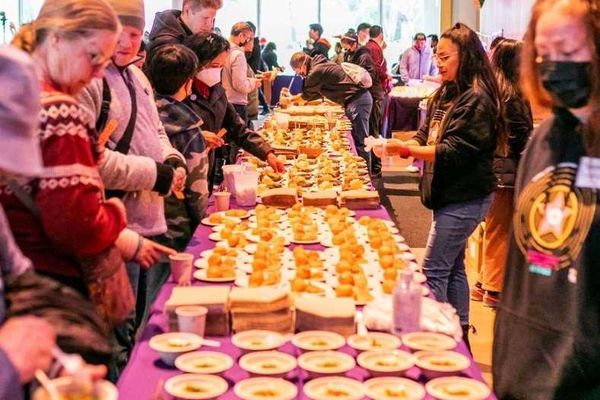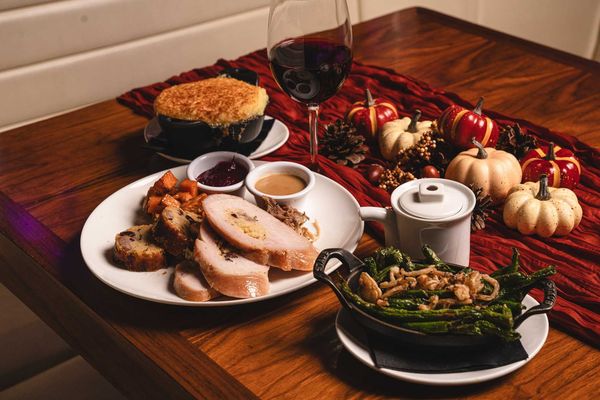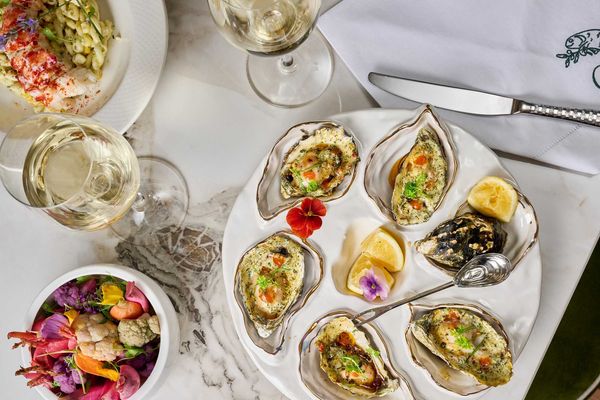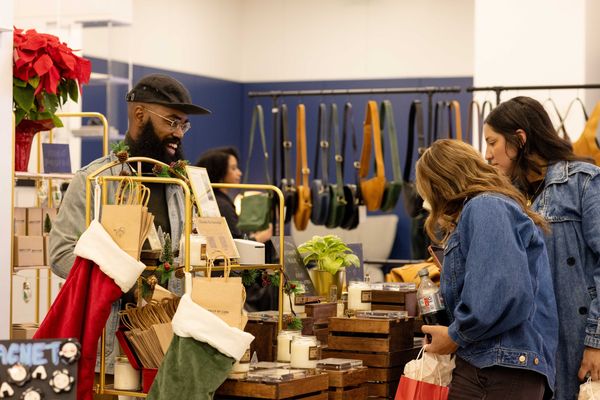When protests sparked by the death of George Floyd began last month, chef Nelson German was in the kitchen at alaMar. Outside the large windows lining the restaurant on Grand Avenue in Oakland, crowds gathered. Emotions ran high.
"As a person of color, I was sad I couldn't be out there. What happened to George, [it's] heartbreaking. That could have been me or someone I've known," German says. He feared for his staff, many of whom are young and African-American and, as some among the protestors turned to smashing up and looting local businesses, he feared for his restaurant.
"The amount just to pay for new windows and doors, it's going to be tremendous," he explains. That alone could have put alaMar out of business, especially at a time when pandemic restrictions are already having a major impact on its viability.
Instead, Oakland stepped up. The community defended the restaurant, protecting it from harm.
Even before it helped to shield alaMar, Nelson German had great love and respect for his adopted city. German was born and raised in Manhattan's Washington Heights neighborhood, at the epicenter of the United States' Dominican diaspora. As a teenager, he began to fall in love with cooking, but for years his adventures in the kitchen were a closely protected secret.
In "Dominican culture, it wasn't typical for a man to be in the kitchen. Because of that I didn't show my passion or my hobby for cooking. So, even experimenting, I'd wait until my parents left the house," he recalls.
By his early 20s, German began to take on the role of master griller at backyard barbecues. Everyone agreed, the man had talent. Emboldened by their response to his cooking, German got his first job in a restaurant kitchen. For the next decade he honed his skills in New York, developing a style that drew as much from his Dominican roots as from the Mediterranean and Asian cuisines he helped prepare.
Eventually, the time came for German to open his own restaurant. With his wife, May, at his side, he returned to her hometown of Oakland and, in 2014, they opened alaMar. It was a dream come true for German, the chance to tell his own story through his food. "That's the special thing about being a chef-owner," he says. Opening a place of your own "shows how far we have come." He filled the menu with childhood inspirations, memories from growing up, and original dishes.
While alaMar is technically a seafood restaurant, its menu is more accurately described as a stroll through German's life. Chef's braised meats—braised oxtail is on the current takeout menu—come straight from his mom's home cooking repertoire. Braised chicken "is the one dish I always ask her to make for me when I go to visit. It's slow and low and you have to braise it for two hours. It's a dish you put a lot of love into," he says.
One early alaMar dish, fried goat cheese stuffed with camembert with a spiced beef puree and honeycomb, was inspired by a dish at a Spanish tapas restaurant German and May frequented in New York. And elements from a decade of summers spent with friends in Puglia, Italy, where he played and worked in home and restaurant kitchens, show up in his crudos, ceviches, and other dishes. "They really focus on the seafood but you don't need too much cooking," the chef says. These dishes are "using ingredients I don't normally don't see in Italian restaurants in the U.S., like pistachio, turmeric, and saffron."
German's range and talent is not unusual among Black chefs who, all around the country, are innovating in kitchens that specialize in a wide variety of cuisines. But the recognition he's received as a Black chef—even the fact that he owns and operates a restaurant that is not specifically dedicated to soul food or African food—is rare.
"I'm in an industry where there were a lot of great chefs but they never got recognized," says German. Confronting those racial disparities drives him. "It's about more than just greens and cornbread. We can have sexy restaurants."
For nine brief days before the Bay Area's shelter-in-place order was issued in March, German was once again poised to break out of the box with his second establishment, Sobre Mesa. Unfortunately the cocktail lounge, which specializes in refined drinks and Latino-Caribbean tapas inspired by the chef's Dominican roots, has spent its first months closed to the public, though some of the new eatery's best dishes and drinks are available through AlaMar's takeout and delivery menu.
Meanwhile, open for takeout and delivery (outdoor dining in Alameda County was abruptly shut down last week, effectively closing the restaurant's patio), alaMar is thriving. It's one of the most unexpected things to come out of this moment where racial reckoning and confrontations of police brutality have slammed head first into a global pandemic, says German. In June, the restaurant even broke its former sales record.
That community support has allowed alaMar to pay its good fortune forward. At the beginning of shelter in place, they partnered with The Lee Initiative to provide 300 meal kits a day as part of the Restaurant Workers Relief Program. Now they've joined up with World Central Kitchen to donate 100 to 150 meals daily to the homeless.
"It's just who I am and how I grew up that you always give back and better things come towards you," says German. "It's a genuine team here [in Oakland]. It's really about building community and helping the city become the best city in the country."
// alaMar is open for takeout and delivery via DoorDash; 100 Grand Ave. (Oakland), alamaroakland.com





















